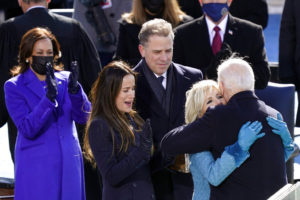
Ethan Lindenberger testifies against his anti-vaccination parents before Congress. Photo courtesy of NBC News.
With the 2020 election already hanging over our heads, it’s fairly easy to picture which socio-political issues will be taking center stage in a few months during the presidential debates–namely topics like immigration policy, environmental concerns, and (unsurprisingly) gun reform. And yet, there is one highly controversial issue that remains both highly visible in the media but has not been seriously picked up by either major political party: the anti-vaccination movement.
On the surface, there are several aspects of the anti-vaccination movement that could seem connected to each of the two major parties, though sometimes in a seemingly contradictory way. For example, we often tend to align a preference for less government intervention with Republicans, meaning that we could draw the conclusion that anti-vaxxers might sway to the right if they have concerns about possible government-mandated vaccines being put into place. However, on the other hand, we frequently tend to think of personal medical choices (namely those associated with a woman’s right to choose) as being related to the Democratic party, therefore leading us to the assumption that anti-vaxxers might sway left if they base their arguments around a person’s right to their own choices about their body.
The question about the partisanship of vaccines, though, has less to do with assigning a political label to the issue, and more with thinking ahead toward what policy, if any, may be brought forward to address the increasingly frequent outbreaks of serious diseases. For the majority of Americans, it’s pretty difficult to imagine why a person might actually choose to expose their child and all those who come in contact with them to deadly diseases. This means that most people are not worrying day-to-day about scenarios in which laws could be changed to make it easier to legally avoid having your child vaccinated. In fact, according to Pew Research, about 83 percent of Americans think that vaccines are safe, with those same numbers reflecting across nearly every demographic. They go on to report that there is a pretty insignificant difference between Democrats and Republicans on this front, with about 89 percent of Republicans and 87 percent of Democrats agreeing that vaccines are generally safe.
In the end, the real differences come down to the information people believe. In the words of David Salmon, director of the Institute of Vaccine Safety at Johns Hopkins University, people who do not vaccinate their children “tend to be better educated. They tend to be white, and they tend to be higher income. They tend to have larger families and they tend to use complementary and alternative medicine like chiropractors and naturopaths.” As of late, anti-vaxxers have been making a lot of noise in the news, with several big stories about parents refusing to vaccinate their children. Just a few weeks ago, 18-year-old Ethan Lindenberger testified in front of Congress against his anti-vaccination parents, as he was vaccinated against their wishes. Though there may not be a partisan sway on this issue, it’s still a massive safety issue for the U.S. and the rest of the world. I would sincerely hope that both major parties put forth an effort during the coming election to continue to promote the factual information that vaccines are not only safe but are completely necessary for a modern society.
Lila Olson
Lila, a staff writer at “In the Zeitgeist,” is a junior at NYU who is triple majoring in English Literary Studies, Politics, and Spanish. She is originally from Raleigh, North Carolina, and has experience writing professionally in both English and Spanish-speaking settings, as well as several years of experience working closely with children. In the future, Lila hopes to establish a career based in clinical social work or rehabilitation counseling. When she’s not busy working on homework, Lila enjoys painting, spending time with her family and dogs, and discussing time travel.



